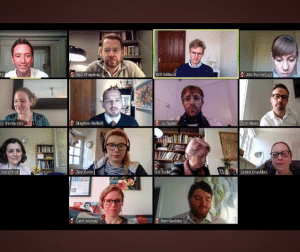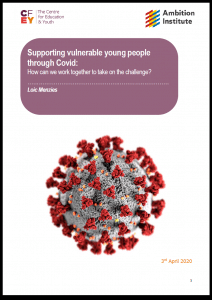Business as (un)usual: Supporting vulnerable learners through Covid
by Loic Menzies
27th March 2020
We were honoured today to be joined by nine thoughtful and insightful panellists for a roundtable on supporting vulnerable learners through Covid. Pannelists included school leaders, a university professor and an Education Psychologist, alongside an audience of nearly 200 teachers, youth sector professionals, local authority staff, policy makers and governors.
As part of the discussion, Leora Cruddas, Chief Executive of the Confederation of School Trusts spoke for many saying:
This is business as unusual.
Three metaphors
Three metaphors were used to sum up current events:
- This is a marathon not sprint: we are not just working out how to cope in the next few weeks but over many months. As Russell Hobby from Teach First has been saying, we are looking at a summer of separation that will be followed by an autumn of disruption.
- Sector professionals need to put on their own oxygen mask first: we cannot help the young people we serve unless we look after ourselves first.
- At times this will feel like a game of ‘whack a mole’: new problems and challenges will emerge constantly, many of them will be un-expected. Different parts of the sector will need to take the opportunity to step in and tackle the challenges as and when they are spotted.
Three themes
Many themes emerged from the discussion but perhaps three sat at the heart of things.
1. Workforce
Professionals have responded with extraordinary energy and commitment. However there is a considerable risk of exhaustion, particularly as more of the workforce becomes unwell. Some schools have already established rotas to mitigate this risk. Unfortunately, this exhaustion will become increasingly emotional, as bereavement becomes a more frequent experience.
Teachers are also having to shift their role to become more pastoral. Form tutors’ responsibilities have become more important and energy needs to be directed towards these roles as well as curriculum and setting work. Support can be brought in from Education Pscychologists and similar professionals, but services are stretched.
2. Resources
We have heared a lot about school meals and access to technology but for some pupils, space; pens; and paper are concerns too.
There is work going on to provide vouchers for data, or dongles to improve access to online learning. Third sector and charity organisations have a role to play here and they are helping to champion these issues.
Some schools are making ensuring that resource packs support family relationships, wellbeing and some of the wider experiences that schools normally offer by including leisure-focused activities for pupils to do with their families, as well as learning materials.
3. Outreach and safeguarding
Demands on foster carers and social workers are huge, and schools are stepping into new and unfamiliar roles. However they should not be alone and it is encouraging to see that in some areas, youth services and different schools and education providers are being brought together in daily morning meetings to coordinate local responses.
In some cases it is not safe for vulnerable learners to come into school and staff are instead setting up scheduled regular calls and visits.
There are particular concerns about young people on the margins of being designated ‘vulnerable’. In effect, schools need to conduct triage and many schools are RAG rating pupils to decide what support they can and should provide.
This is a marathon not a sprint. How can we come together to support vulnerable learners? Share on XWhat next?
Ultimately, there are fundamental and controversial questions about what should be prioritised at the moment. This will change over time, and it may be helpful to think in the short, medium and long term, with priorities gradually shifting.
 For our part, we would like to help however possible. Unfortunatley we don’t have the answers but we are able to convene spaces like this where professionals can reflect and share.
For our part, we would like to help however possible. Unfortunatley we don’t have the answers but we are able to convene spaces like this where professionals can reflect and share.
We have posted a video of the roundtable below and will now produce a podcast exploring some of these themes in more detail.
We will also write a more detailed summary of the discussion and the survey responses from over 200 people who signed up. We will use all of this to contribute to discussion and thinking however possible, through blogs and other articles as well as ongoing discussions with policy makers and funders.
But let us know what else we can do.
You can now download our report, including 15 ‘Ideas for Action’ here


